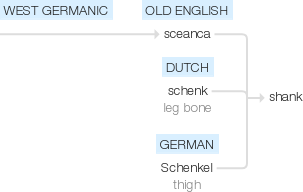Shank
Old English sceanca, of West Germanic origin; related to Dutch schenk ‘leg bone’ and German Schenkel ‘thigh’. The use of the verb as a golfing term dates from the 1920s.
wiktionary
From Middle English schanke, from Old English sċanca(“leg”), from Proto-West Germanic *skankō, from Proto-Germanic *skankô (compare West Frisian skonk, Low German Schanke, German Schenkel(“shank, leg”), Norwegian skank), from *skankaz (compare Old Norse skakkr(“wry, crooked”)), from Proto-Indo-European *(s)keng- (compare Middle Irish scingim(“I spring”), Ancient Greek σκάζω(skázō, “to limp”).
etymonline
shank (n.)
Old English sceanca "leg, shank, shinbone," specifically, the part of the leg from the knee to the ankle, from Proto-Germanic *skunkia- (source also of Middle Low German schenke, German schenkel "shank, leg"), perhaps literally "that which bends," from PIE root *skeng- "crooked" (source also of Old Norse skakkr "wry, distorted," Greek skazein "to limp"). Shank's mare "one's own legs as a means of transportation" is attested from 1774 (shanks-naig).
shank (v.)
1927, in golf, "to strike (the ball) with the heel of the club," from shank (n.). Related: Shanked; shanking. Earlier as "to take to one's legs" (1774, Scottish); "to send off without ceremony" (1816).
